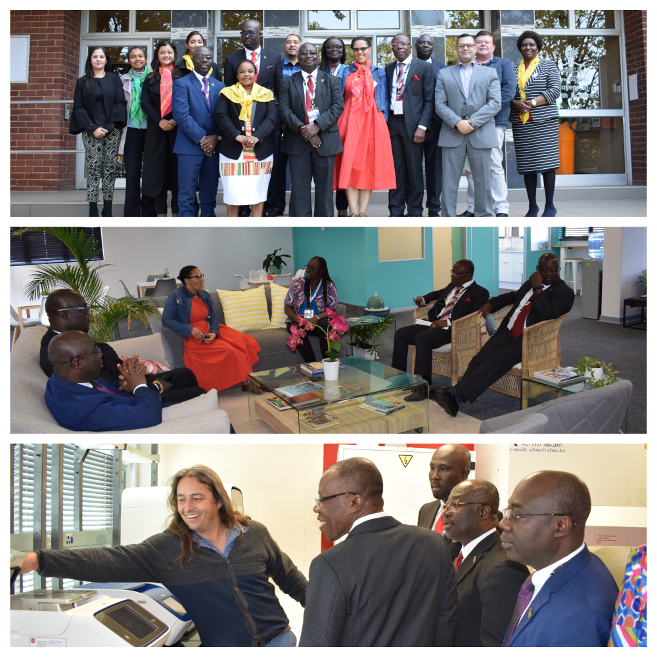 The Delegation from KNUST tours UKZN.
The Delegation from KNUST tours UKZN.UKZN Welcomes Partnership with KNUST
UKZN’s College of Health Sciences recently hosted a delegation from the Kwame Nkrumah University of Science and Technology (KNUST) based in Ghana. Named after Ghana’s first president, the university is also structured on the College model. KNUST’s College of Health Sciences (CHS) found many synergies with UKZN and both parties were excited about the possibility of signing a Memorandum of Understanding in due course.
Professor Yaw Adu-Sarkodie, provost of KNUST’s College of Health Sciences, introduced the team which consisted of Professor Ellis Owusu-Dabo, Dean: School of Public Health; Professor Daniel Ansong, Dean: School of Medical Sciences; Professor Rita Dickson, Dean of Pharmacy and Pharmaceutical Sciences and Dr Otchere Addai-Mensah, Dean of the Faculty of Allied Health Sciences.
The KNUST’s CHS is similar to UKZN’s CHS; offering similar courses and with a strong partnership existing with the Ghana Ministry of Health. KNUST was founded in 1951 and officially opened in 1952. It adopted a College model in 2005. Adu-Sarkodie mentioned that their College is based around the one health concept with collaborations across the various Schools and Disciplines. The KNUST is looking to partner with UKZN for staff and student exchange and research as well as assistance in the development of PhD programmes, especially in Nursing.
Dickson said KNUST’s Doctoral degree in Pharmacy is offered as a six-year course modelled on patient centered care. The students spend four years on campus with the fifth and sixth year clinical rotations taking place in various hospitals. The Faculty of Pharmacy and Pharmaceutical Sciences also offers a BSc degree in Herbal Medicine which is very popular in Ghana. The Faculty has trained 95% of the Ghanaian workforce in Pharmacy. Said Dickson, ‘We want to make good use of the flora and fauna in our country by producing natural products that would deal with the medical conditions in Ghana.’
The School of Public Health offers postgraduate degrees as well as short courses to cater for those in industry. KNUST’s School of Public Health is renowned for its child survival development programmes. Owuso-Dabo commented that malaria is the biggest challenge in Ghana with approximately 20 000 children under the age of five dying annually. Even if a child survives, the consequences from severe malaria such as convulsions or brain dysfunction can hamper long-term development and schooling. In Ghana, 3.5 million people contract the disease annually, thus making it the largest health challenge in West Africa.
Ansong and Professor Ncoza Dlova, UKZN’s Dean of Clinical Medicine looked at the possibilities of Medical students from both universities exchanging for clinical electives in the two countries. Both Deans felt that the students would benefit greatly from the exposure to different conditions and the treatment thereof.
Professor Busisiwe Ncama, Deputy Vice-Chancellor and Head of UKZN’s CHS echoed the sentiments of the CHS team. ‘We have certainly identified a number of areas of synergy and look forward to fostering a partnership with KNUST. We have a lot to learn from each other.’
Words: MaryAnn Francis



